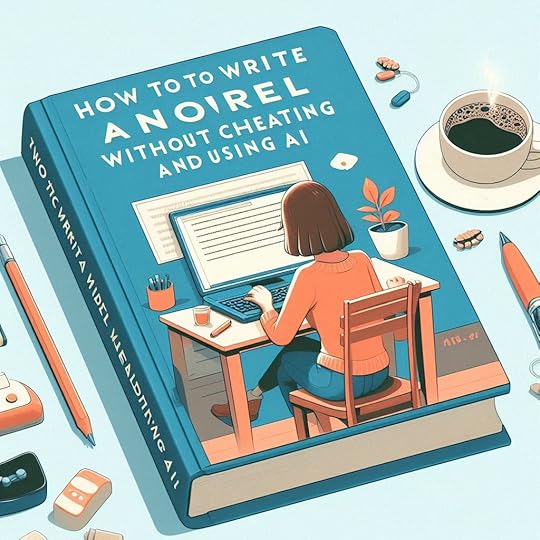Novel Writing 101 (And a little 102)

(Once upon a time when the web was young and before the blogosphere bubble burst, I used to frequently get emails from people asking me questions about the various aspects of writing. I would dutifully answer, then decide that what I’d written would make a great blog post, and post a slightly edited version of it. But that hasn’t happened in quite a while.
(Then, a couple of days ago, I got such an email. And I did my dutiful answer. And then I realized I hadn’t done a post about the writing process in a looooong time. I thought about putting it up. Decided not to because I’d already covered the subject. Changed my mind again because I realized that 1), my ‘Novels 101′ post would be buried beneath years’ worth of other posts, and 2), my outlook on it is likely to have changed.
(So here, then, is what I wrote to a friend of mine about how to start one’s first novel. And to be above board, I have no financial stake in sales of the book or the software I recommend. I’m simply a huge fan of both. Here we go…)
How does one go about starting to write their first novel? Good question. I’ll try to answer without turning it into a novel unto itself.
The best thing you can do is hie thee to Amazon and pick up a copy of this book, Writing the Novel: From Plot to Print by Lawrence Block. Block is a book writing machine and knows his stuff. He’s got several books out there about writing, most of them compiled from the years he spent writing a column about fiction in Writer’s Digest magazine (remember magazines?). This book is brilliant for beginners (Unsolicited endorsement: I have bought and given many copies of this to friends who wanted to write and have recommended it countless more times).
This was an important book to me because I was once sitting where you were wondering where to start and how to do it. And there’s a trap when you’re looking for that. Many writers insist that The Only Right Way [TM] to write a book is their way.
Some examples: you must have an outline. Create a big outline, one that’s at least 1/3 the length of your book (in Hollywood, this is called a treatment). Don’t move on to the next sentence until the one you’re working on is perfect. Take file cards and use one for each character, each prop, each incident, each event, each conflict, put them in order, pick up your first card, put it in front of you, and start writing.
None of this stuff appealed to me because I had tried outlining and discovered that, once I had the outline, I lost interest in the story because I knew how it turned out. For me, part of the mystery was writing to find out what happened next. One day, in despair, I sat down at the typewriter (remember those?) and said, “I don’t care if it means I’m not a real writer. I want to write this book and I’m just going to start writing and see what happens.”
Best thing I could have done. Because a short time later, I found Block’s book and he vindicated me by saying (and I’m paraphrasing here because it’s been a while since I’ve read it): “There is no right way to write a novel. The best way for you to write a novel is what works best for you.”
So this is where you are. And it sounds like you’re not far off from the way I work. Usually when I start a book, I know what it’s going to be about, I know what the opening scene is going to be, and I know how it is going to end. I say usually because things happen while you’re writing. The ending can change (A Death of Honor). There is no ending in mind until one presents itself (The Company Man). You have only a vague idea of what the book is even about and your contract says you’re on deadline (Precious Cargo). Just taking notes that start sounding like chapters and all of a sudden you’re writing a novel (The Smart One).
Basically, I start writing with no outline. As I keep going, the story starts falling into place, and an outline starts forming in my head and gets so big I eventually have to start writing it down. So 100 years from now when they are going through my archives (ha!), they’ll notice that I seem to have written the first third of the book without an outline. Yeah. Pretty much.
This is what makes the first novel particularly challenging. Technically, all novels are first novels (exception: series novels, or series character novels, which tend to be built on some kind of template or formula – I’m looking at you, Janet Evanovich – all tend to feel like the same book over and over again) because you’ve never written them before (my current project? I had to really wrestle out the words on two of the last three chapters I’ve written – and this is book #13 for me). But the first novel, the very first novel, is particularly a challenge because you’re on a voyage of discovery: discovering your story, discovering if you have the mettle to cross the finish line, and particularly, discovering how your brain works and what your actual process is for writing a novel.
So… at the risk of taking all of the joy out of it… you need to sit down and start plugging away. See how it works out for you. If something isn’t working, change tactics. Start outlining. If you’re outlining, quit. Try to figure out what’s holding you back. I should add here that, as you keep at it, your writing methodology will evolve – count on it this first time. And it’ll keep happening – I certainly don’t work the same way I did early on, and it had nothing to do with switching from paper to computer screen.
Now, some Universal Tips for Writing a Novel:
Don’t expect it to be easy. It isn’t. And it shouldn’t be. As one writer put it, “Writing is easy. You just stare at a blank page until drops of blood appear on your forehead” (Faust’s paraphrase). What it is, is satisfying as you see the page count rise.The most important muscle of the writer’s body? The Gluteus Maximus. Park it in a chair, put your finger on the keys, and start writing (unless you’re like Thomas Wolfe, who wrote standing up and used the top of a refrigerator as his desk – he was a tall dude. He also never numbered pages and threw each finished page onto the floor. Not recommended.).
Take heart in the fact that, the more you write, the better at it you will get.
You must treat it like a job – albeit part-time for starters. Set up a schedule. Hour or two a day. Take weekends and holidays off if you want. Or write all day Saturday if you want. Regular schedule. Make it a habit. It’s that important.
Overwhelmed? Consider the power of One Page a Day. Can you write one page (one manuscript page = 220 – 250 words)? Sure! Who can’t? Do that five days a week, take off weekends and holidays, and at the end of a year you will have ~60,000 words. (Hint: the novel starts at 40,000 words.) ( Pro tip: when I don’t feel like writing on a writing day, I have a deal with myself to write at least one page. Because who can’t write one page, right? And usually by the time I’m a page into it, my brain is in gear and I get my day’s allotment of writing done.)
(To keep in mind for later): You made it to the last page? Yeah! Sit back and celebrate with an adult beverage. Then remind yourself you’re not done. Set the book aside and don’t look at it, don’t even think about it, for at least a month. ( Pro Tip: good time to start a new writing project.) Then go back in and start editing. It’ll be easy because you’ll be a better writer than you were when you started, and you’ll see all the mistakes you made. (Note: I still see changes I’d love to make in my published books, which is why I can’t read them once they’re in print.)
For right now, don’t worry about proper manuscript formatting. That’s the easy part, especially with modern software. The key right now is to get words on paper (archaic metaphor for “computer screen”).
Finally, here’s my recommendation of some software that will meet your needs no matter how you end up writing. Though you can actually write any way you want. Pencil and paper. One of those charmingly archaic typewriters (I wrote 2 1/2 novels on one of those beasts!). Microsoft Word (which I used since Version 1.0). A roll of teletype paper (which Vonnegut used to write the first draft of Breakfast of Champions). Pigeon’s blood on a rat’s pelt. Whatever works. I abandoned Word for this because it’s designed for writers, has powerful tools (I love the file card feature), has templates for whatever you want to write – novels, screenplays, comic book scripts, it’s Mac/PC/iOS friendly, and is only ~$60. Not necessary, but something to think about.
And that’s what I have for you. Like I said, a novel in itself. Good luck!
PS. If you use AI… any AI… even the smallest hint of AI… while doing this, I will hurt you. Badly.



